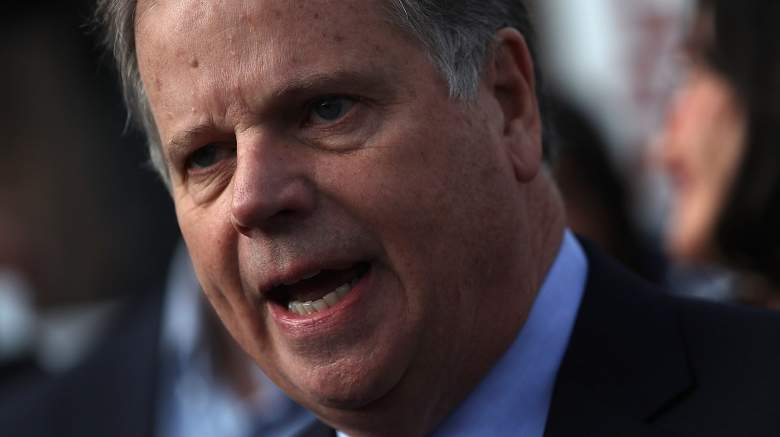
Getty Doug Jones speaks to reporters on Election Day.
Democrat Doug Jones secured a historic victory in the Alabama Senate race, seizing the seat once occupied by Republican Jeff Sessions in a red state that hadn’t elected a Democrat to the Senate statewide for a quarter of a century. He did this despite being trashed as a Chuck Schumer/Nancy Pelosi “puppet” by the Republican president who won the state by a huge margin one year before.
Jones, a former U.S. attorney, squeaked out a 1.5 percentage vote margin, three times that needed to avoid an automatic recount, although his opponent, Roy Moore, refused to concede on election night, his campaign manager pointing out that not all military ballots have been counted (but those don’t appear anywhere near enough in number to change the outcome, as even the Moore supporting Republican Secretary of State told CNN.) How unusual was this victory? According to CNN, “Democrats haven’t won a Senate race in Alabama since 1992, back when GOP. Sen. Richard Shelby was still a Democrat (he switched parties in 1994).”
Live Results
Note: The results table below is powered by the Decision Desk HQ.
How did Jones do it? How did he win? Let’s start with the obvious. Obviously, Moore was hobbled – fatally it turns out at the ballot box – by the series of sexual misconduct accusations against him. He denied them, and exit polls showed voters were pretty evenly divided on whether they believed them, but the accusations, and the #metoo climate that surrounded them, were obviously decisive. They weren’t the only factor behind the victory, but, without those accusations, we might very well be looking at Sen. Roy Moore.
Here are some of the other reasons Jones won:
The Moore Accusations Involved Underage Girls
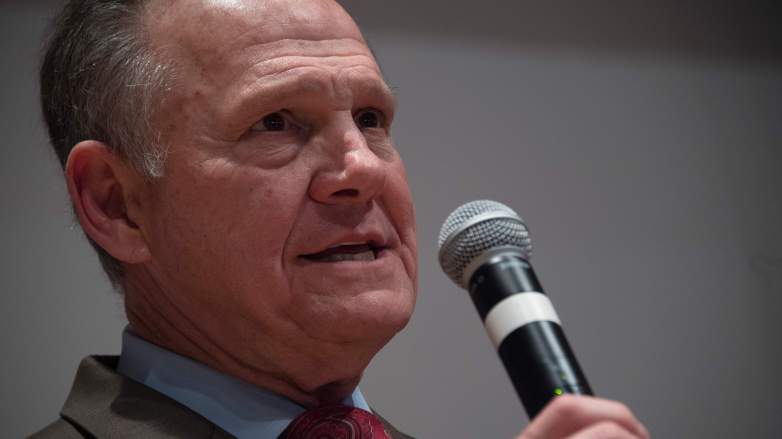
GettyRepublican Senatorial candidate Roy Moore addresses his supporters in Montgomery, Alabama, on December 12, 2017.
Although it’s tough to survive sexual misconduct accusations in the #metoo era, it can be done (just ask President Trump). However, voters are far less likely to forgive accusations involving people who are underage (just ask Kevin Spacey).
Voters summed it up more bluntly:
The most disturbing accusation against Moore came from a woman who alleged he had sexual contact with her when she was 14 and he was a state prosecutor in his 30s. He denies all of the allegations, but there was a pattern of accusations also, not just one. According to exit polls, female voters slightly outnumbered male voters.
The African-American & Suburban Vote
African-Americans in Alabama turned out for Jones in a big way, showing that Jones did a far better job energizing the Democratic base than Hillary Clinton, a weaker and polarizing candidate, did. No group of voters is driven by a single issue, but Moore’s recent comments on slavery probably didn’t help. Urban and suburban voters turned out for Jones en masse, surmounting Moore’s strength in rural areas.
According to The Daily Beast, “Jones won Dallas County, which encompasses Selma, with 10,492 votes to Moore’s 3,485. And black-voter turnout, according to exit polling, was 28 percent—the same rate they turned out for Barack Obama in 2012.” Jones deserves credit for running a smart campaign and working hard. His background as a U.S. Attorney may also have given him extra appeal with some black voters.
“Jones—who is best known for successfully prosecuting two Ku Klux Klan members who bombed the 16th Street Baptist Church in Birmingham—spent the closing days campaigning hard in the black community,” noted Daily Beast. In contrast, Moore made a much derided comment on slavery in the waning days of the campaign, saying, “I think it was great at a time when families were united, even though we had slavery, they cared for one another. People were strong in the families. Our families were strong, our country had a direction, and we corrected many of the problems.”
Added Daily Beast, “Jones brought key black figures into the state, including Sen. Cory Booker (D-NJ), former Massachusetts Gov. Deval Patrick, and NBA legend Charles Barkley, in an effort to turn out as many black voters in the state as possible.” It worked. Half of the counties with rising turn-out were in the so-called “black belt” areas with high African-American populations, reported CNN. Similarly, turnout rose in big metro areas with large cities that are Democrat strongholds.
Jones did not take African-American voters for granted. Mother Jones noted of Jones: “His campaign aired ads on black radio stations about health care, a major issue in the African American community.”
“The big four metro counties combined saw their turnout increase by roughly 6.5% above the 2014 midterm levels. Turnout in the 13 other suburban and exurban counties was essentially even with 2014’s levels. In the 21 rural Black Belt counties, turnout was actually down slightly overall. But in those 29 white rural counties, turnout was down 5.4%,” CNN reported.
Young voters in college may have also played a role. The largest swing in support from Trump to Jones came in college town areas.
The other group that Jones energized: Suburban voters. According to CNN, he managed to compel “well-educated suburban communities to support the Democrat. And turnout in these areas was higher than in other parts of both states.”
The Enthusiasm Factor: Republicans Stayed Home
Simply put, some of Moore’s voters stayed home, perhaps unable to vote for a man accused of sexual contact with a teenager but not desiring to vote for a Democrat with Jones’ policy positions, either. Whereas Trump generated big rallies and could lay claim to voters with more enthusiasm in 2016, in 2017, the enthusiasm belonged to Jones’ side, and it wasn’t only because of the recent accusations against Moore.
Moore’s history of controversial statements, underscored by his campaign spokesman’s last-minute remarks to Jake Tapper; his history of anti-homosexuality remarks; his penchant for mixing theology and public office… all of it made him anathema to Democrats. And that made them turn out to vote. In contrast, Jones, a former U.S. attorney, a native of Alabama, and the son of a steelworker, may have seemed like a solid and fairly moderate choice.
Turnout may also have been affected by the fact that it was a special election held in the middle of December. In lower turnout contests, the enthusiasm factor matters all the more.
Write-In Votes
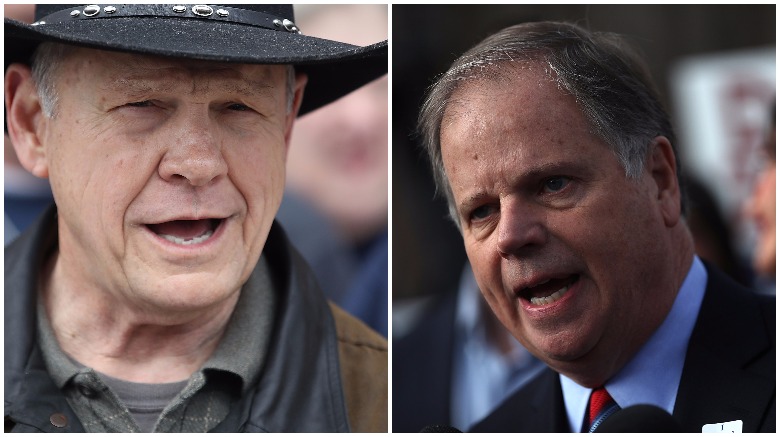
GettyThe race between Roy Moore and Doug Jones is expected to be tight.
President Donald Trump tried to blame the write-in vote factor for Jones’ victory. He wrote: “Congratulations to Doug Jones on a hard fought victory. The write-in votes played a very big factor, but a win is a win. The people of Alabama are great, and the Republicans will have another shot at this seat in a very short period of time. It never ends!”
It’s true that there were a lot of write-in votes (22,800), enough to decide the election. Slightly more people wrote in someone other than Jones and Moore than the margin of victory for Jones. Although it’s not clear whether those were Democratic or Republican voters, with the scandals hobbling Moore, it’s a pretty good bet that a lot of them would have normally voted for the GOP (or a candidate like Luther Strange, had he made it through the primary instead.)
Jones Raised & Outspent Moore By a Large Margin
In a race this close, advertising can matter a lot (and the sexual misconduct accusations gave Jones a lot to work with). According to Vox, the accusations and Moore’s controversial past encouraged Democratic groups to pour “time and money” into Alabama, when they might otherwise have given the red state a pass.
On election day, Vox reported: “Democratic nominee Doug Jones has raised the most money by far. The Birmingham lawyer has raised $11.5 million in individual contributions since May — more than double the $5.2 million raised by Republican nominee Roy Moore, according to federal campaign finance data.” Vox noted that Jones received more money both from people inside and outside Alabama. Jones “has raised $7.6 million more from people living outside Alabama than Moore has,” reported Vox, although a higher percentage of Moore’s money came from out of state.
Not surprisingly then, Jones spent more money on television advertising. According to NBC, as of the Friday before the election, “Jones’ campaign had outspent Moore by nearly a six-to-one margin on the airwaves, $7.2 million to $1.2 million. A total of $11.6 million had poured into the race during the general election as of late last week, with a big assist for Jones coming from Democratic super PAC Highway 31, which spent $2.3 million statewide on broadcast, cable and radio.” Put more simply; Jones outspent Moore 6 to 1 on TV ads, according to NBC.
Moore Was Never That Popular in Alabama
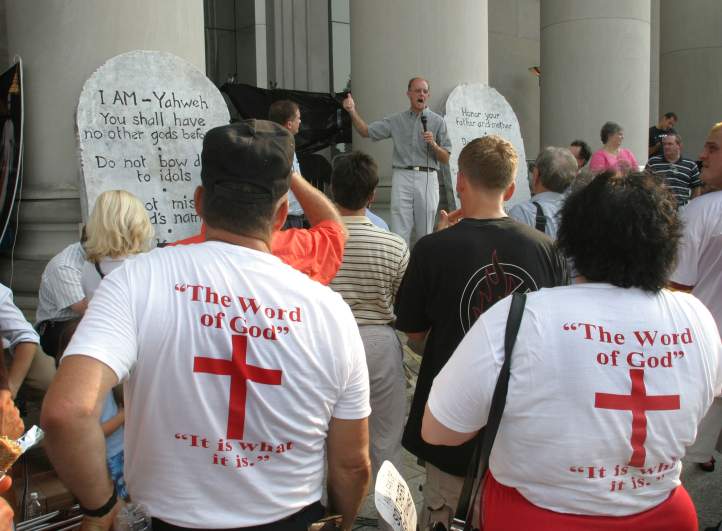
gettySupporters of Alabama Chief Justice Roy Moore rally outside the judicial building August 26, 2003 in Montgomery, Alabama. A 5,300-pound sculpture of the Ten Commandments remained in the building’s rotunda after a federal court order called for its removal.
Moore didn’t have a beloved reputation to fall back on. He was already a controversial and weak political figure in Alabama, dating to his battles on the state Supreme Court. His tenure there was rocky. As Ballotpedia notes, “He was suspended from the bench in 2003 and subsequently removed from the court by the Alabama Court of the Judiciary. He was elected as chief justice a second time in 2012.” He refused a federal judge’s orders to remove a Ten Commandments monument from the state courthouse. He defied the U.S. Supreme Court on same-sex marriage.
In 2012, he was re-elected to the state Supreme Court by a small margin, only winning 51.8 percent of the vote. He won the primary that year with only 50 percent of the vote. By that measure, Moore’s support didn’t erode that much; it wasn’t that strong to begin with, giving him little room for error. In 2010, Moore ran for governor of Alabama and pulled in only about 19 percent in a crowded Republican field, showing he was regarded as a fringe candidate. He lost a Republican primary for governor in 2006 by a huge margin too, according to Ballotpedia.
Jones won with 49.9 percent of the vote on December 12 to 48.4 percent for Moore.
Also demonstrating Moore’s weakness as a candidate, although he won the GOP primary, it was largely a three-way race, and the other two main candidates, incumbent Luther Strange and Congressman Mo Brooks together pulled in more votes. Many Senate Republicans opposed Moore’s candidacy.
Moore Has a History of Outlandish Remarks
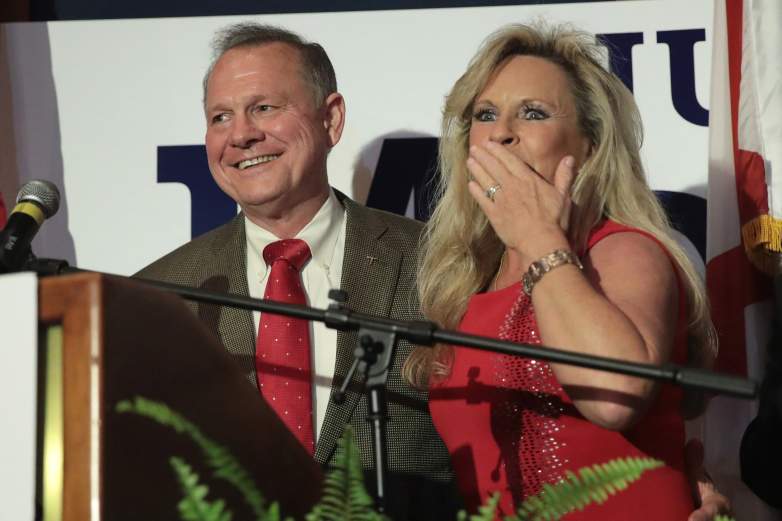
GettyRoy Moore and his wife, Kayla.
Moore has made remarks considered anti-gay and anti-Muslim that are out of the mainstream even for some Republicans. Here’s a roundup of some of them. His wife saying that the couple has a Jewish attorney on the campaign trail caused controversy too.
Moore Isn’t Trump Or People Are Tiring of Trump
Some areas that went for Trump in 2016 flipped to Jones. What does this mean? Well, Roy Moore is not Donald Trump. Moore might share some things in common with Trump: Bombastic comments and defiance against the establishment, for example. However, Trump was a reality TV star branded in some people’s minds as a tough businessman from his time on The Apprentice, and some people might have voted for him to see what he could do with the economy. Trump was also running against an extremely polarizing opponent.
Moore had none of that. He’s also not a billionaire able to self-fund, and he never figured out how to drive the news cycle like Trump does. No one does Trump like Trump. Of course, Trump went all in for Moore at the end, so the Jones’ victory also demonstrates the weakness of a Trump endorsement in a strongly red state that he won by a huge margin. Whether that’s because voters are tiring of Trump or because of the uniquely weak candidacy of Roy Moore or both is not entirely clear.
Along those lines:
Trends Nationally Are Swinging Back in Democrats’ Favor
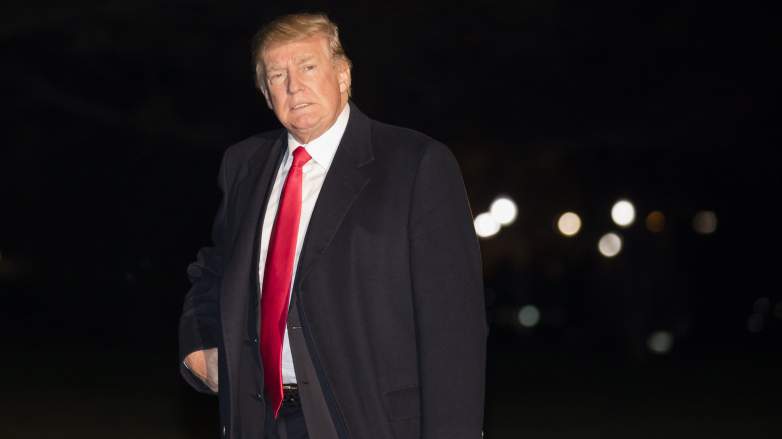
Getty President Donald Trump returns to the White House in Marine One on December 10, 2017 in Washington, DC.
There’s starting to be a trend line in favor of Democrats. Perhaps Trump fatigue – after the Mueller investigation, numerous controversies, legislative failure – is already setting in. “…the Alabama results also reflect trends in prior elections like the race for governor in Virginia this year that could bode well for Democrats in the upcoming 2018 mid-term elections when control of the House of Representatives, and now the Senate, will be in play,” noted CNN.
“This emerging Democratic advantage includes energized support from non-white voters, elevated party turnout in metropolitan areas and stronger performance in well-educated suburban communities. At the same time, Republican turnout in white rural counties that gave a significant boost to Donald Trump in 2016 has lagged in two key contests, the Virginia gubernatorial election and Tuesday’s Alabama Senate race,” reported CNN.
The election may also demonstrate the lack of staying power of the anti-establishment, Steve Bannon movement that Trump exemplifies.

